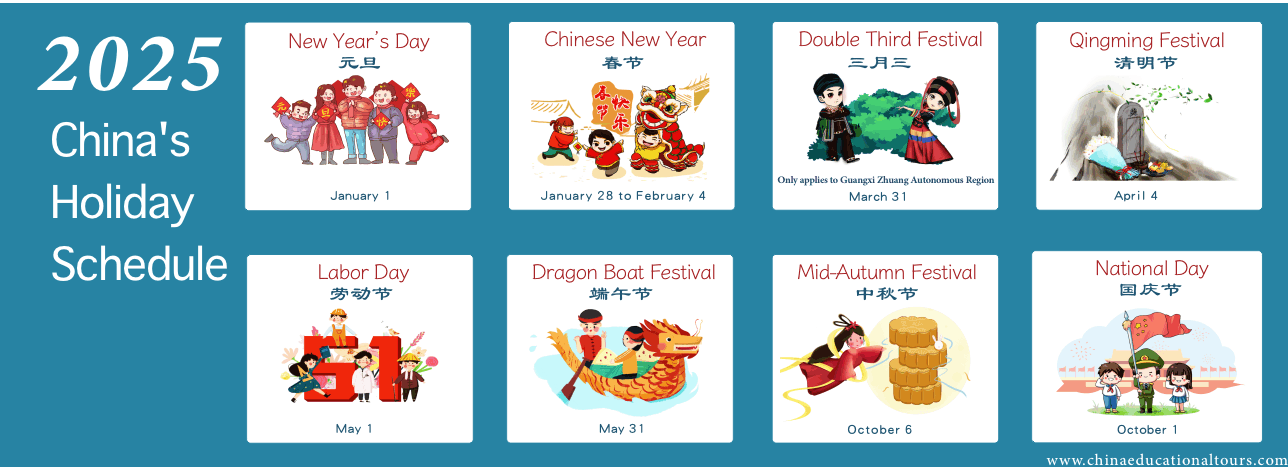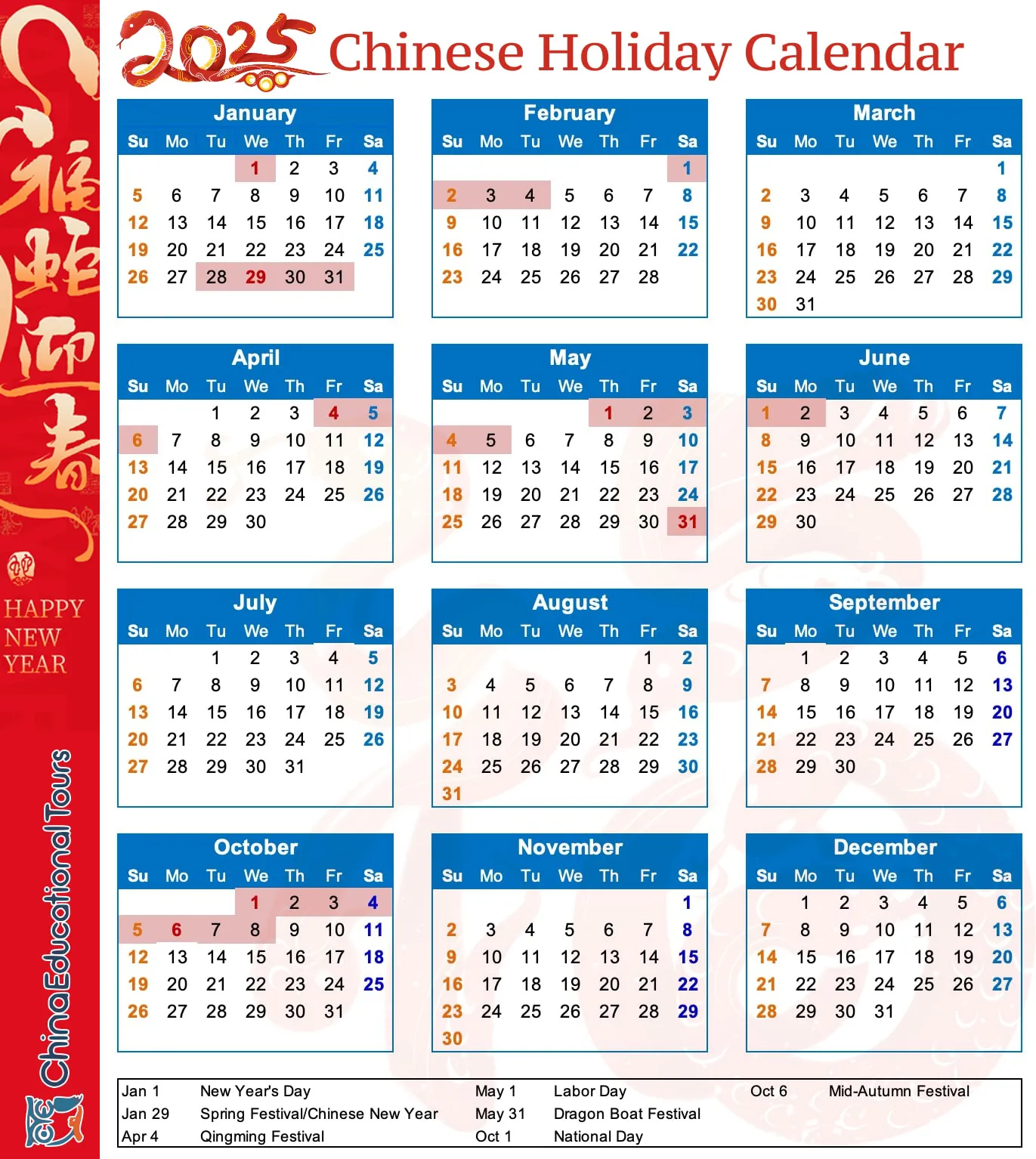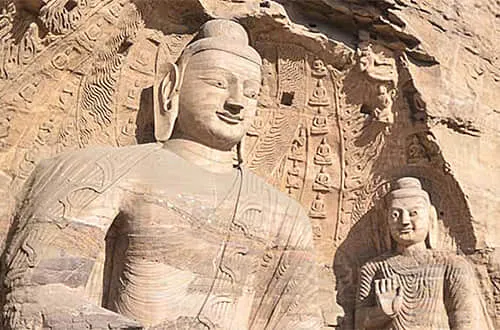China Public Holiday Calendar in 2025

In China, there are seven official holidays in a year, namely New Year’s Day, Chinese New Year (Spring Festival), Qingming Festival, Labor Day, Dragon Boat Festival, Mid-Autumn Festival, and National Day. Among these official holidays are four traditional Chinese holidays, which always subject to the lunar calendar. The Double Third Festival, however, is only celebrated by Zhuang Nationality in Guangxi Zhuang Autonomous Region.
Detailed schedule of all Chinese public holidays in 2025:
| Festival | Official Holidays | 2025 days off | |
|---|---|---|---|
| New Year's Day | 1 day | Jan. 1st, 2025 | |
| Chinese New Year | 4 days | Spring Festival falls on January 29th, 2025, and the holiday lasts from January 28th to February 4th. | |
| Double Third Festival |
3 days (the third day of the third lunar month ) Only applies to Guangxi Zhuang Autonomous Region |
It is celebrated on March 31st, 2025. Because of the weekend, the holiday has been extended to include March 29th, 30th, 31st, and April 1st. | |
| Qingming Festival | 1 day | It falls on April 4th, 2025. The holiday is April 4th to 6th. | |
| Labor Day | 2 days | Labor Day falls on May 1st, 2025. The holiday period is from May 1st to May 5th. | |
| Dragon Boat Festival | 1 day (the fifth day of the fifth lunar month) | The Dragon Boat Festival is on May 31st, 2025, a Saturday. It's likely that the holiday will be extended to include the weekend, from May 31th to June 2nd. | |
| Mid-Autumn Festival | 1 day (the fifteenth day of the eighth lunar month) | Mid-Autumn Festival in 2025 falls on October 6th, which coincides with the National Day holiday. The combined holiday period is from October 1st to 8th. | |
| National Day | 3 days | National Day is on October 1st, and due to the overlap with Mid-Autumn Festival, the holiday period extends from October 1st to 8th. | |
| The 2025 holiday schedule in this table was updated based on the latest official holiday dates for 2025. | |||
China Public Holidays List
New Year’s Day (Jan. 1): This festival marks the start of the New Year according to the Gregorian calendar. While not celebrated with as much anticipation as in most other countries, many young people today enjoy staying up until midnight, going to parties, and/or watching a mass releasing of red Chinese lanterns or fireworks to countdown the end of the year.
Chinese New Year (varies): In 2025, Chinese New Year falls on January 29th (2025 is the year of Snake), but varies each year according to the lunar calendar. Commonly, and somewhat confusingly, referred to in China as “Spring Festival”, this is the biggest and arguably most important holiday of the year as nearly everyone in China gets around 10 days off. With 100’s of millions of people traveling within the span of a few weeks, crowds and traffic jams are unfortunately all too commonplace, and in fact, Chinese New Year is currently the largest human migration on the planet. During this time, many people who work far from their hometowns will make the arduous, time-consuming journey back to visit family and friends where they spend several relaxing days together eating, visiting more relatives, making their own small fireworks display or going to see large displays put on by their municipality, and eating some more. Gift giving is almost exclusively done by older generations passing out specially designed red envelopes (they must be red) to younger generations that contain cold, hard cash.
Double Third Festival (varies): In 2025, this festival falls on March 31st. It is an important traditional festival of the Zhuang ethnic group in Guangxi, China. It is celebrated on the third day of the third lunar month every year. This is a popular festival across Asia for ethnic minorities, such as Zhuang, Yao, Dong and Miao. The festival involves different activities for each group; however, in general, many people celebrate with a lot of singing and dancing while wearing traditional clothing or perhaps taking advantage of the nice weather and going for a picnic or another relaxing outdoor activity. Since the holiday usually falls close to the next holiday, “Qingming”, observers of this holiday usually get 4-5 days off, which makes for a good opportunity to take a trip.
Qingming Festival (Apr. 4th or 5th): In 2025, this festival falls on April 4th, but since its tied to the solar calendar (Gregorian), it always falls on either the 4th or 5th. Also known as Tomb Sweeping Day, this holiday celebrates an observance that goes back over 5,000 years – remembering one’s ancestors and visiting their grave sites. Those who live within a reasonable distance of their relatives’ burial plots will spend the whole day at the cemetery, bringing flowers or food, or burning incense or special remembrance papers.
Labor Day (May 1st): This is an international holiday normally celebrated on May 1st around the world (with the notable exception of the U.S. holding it in September) and it commemorates the achievements and contributions of workers. Most Chinese celebrate by traveling domestically and or going to local tourist attractions – like amusement parks or even the beach – which get very crowded.
Dragon Boat Festival (varies): In 2025, this unique and fun holiday is celebrated on May 31st. Known for the racing of specially built wooden long boats captained by a person who rhythmically beats a drum while dozens of people row (and splash) in spectacular unison. So impressive are these traditional long-boat races that they are beginning to spread to many cities around the world, although they have customarily been held in mainland China, Hongkong, and Macau. The traditional Chinese Dragon Boat Festival commemorates patriotic poet Qu Yuan and people love to gorge themselves on the holiday’s traditional sticky rice dumpling named "Zongzi" (pronounced Tzong-Zih).
Torch Festival: In 2025, the torch festival is a holiday from August 17th (June 24th in the lunar calendar) to August 24th. The ethnic minorities like the Yi, Bai, Naxi, Hani, Lisu, Lahu and Pumi, they all come together to celebrate one exciting festival - the Torch Festival! The Torch Festival of the Yi ethnic group involves the highest number of participants. The festival features brightly burning torches and flames. Of all the festivals celebrated by the Yi people, the Torch Festival stands as the most magnificent.
Mid-Autumn Festival (varies): In 2025, this festival will be held on Oct. 6th and always coincides with this month’s full moon. Taking advantage of nice, cooler weather and the traditional harvest season, Mid-Autumn is another time for families to get together, have a big meal, and then at night, go outside and gaze at the bright full moon while eating a sweet, cake-like dessert appropriately called “Moon Cakes”.
National Day (Oct. 1st): National Day commemorates the founding of the People’s Republic of China on October 1st, 1949. It is also known as “Golden Week” because people usually get 7 full days off work. Nearly comparable in migration size as Chinese New Year, 100’s of millions of people take advantage of the extra-long holiday and travel–either back home, domestically for fun, or internationally. All modes of transportation are busy during this time.
Tour Recommendations
First trip to China? Take this highlight tour:
1) Experience the Golden Triangle (8-Days Beijing-Xi'an–Shanghai)
Already seen many world-famous destinations in China? Try these more in-depth tours and experience the Real China:
2) Discover China's Ancient Capitals (10-Days Shanghai-Luoyang-Xian-Pingyao-Beijing) )
Escape to the less-touristed south China for jaw-dropping river cruises with mesmerizing rocky hills and outcroppings:
3) Guilin Outdoor Adventures (7-Days Longsheng-Guilin City-Yangshuo)

 Top 10 Landmarks in China
Top 10 Landmarks in China  Top 10 Guilin Photography Locations
Top 10 Guilin Photography Locations  Top World Heritage Sites in China
Top World Heritage Sites in China  China 2025: Top 12 Travel Destinations
China 2025: Top 12 Travel Destinations